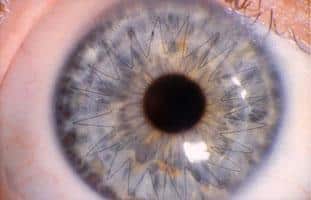PK
CONTENTS
What is PK?
PK, or penetrating keratoplasty, is a full-thickness corneal transplant. When the cornea is so diseased or injured that other procedures simply won’t work, a corneal transplant is the next solution. PK involves removing and replacing the damaged corneal tissue with a healthy donor tissue.
When would I need a PK?
Typically, disease or injury confined to the outermost layers of the cornea can be treated without scarring or vision loss. However, when inner layers are affected, there is a greater risk of  permanent damage to vision. In these situations, a corneal transplant is the best option. When a corneal injury or disease leaves the cornea scarred or damaged, it can greatly affect a patient’s life.
permanent damage to vision. In these situations, a corneal transplant is the best option. When a corneal injury or disease leaves the cornea scarred or damaged, it can greatly affect a patient’s life.
Some conditions that often require a corneal transplant include:
- Fuch’s dystrophy
- Keratitis
- Corneal stromal dystrophies
- Regrafts
- Keratoconus
- Corneal ulcers
The Surgery
Corneal transplant surgery is an extremely common procedure, with approximately 40,000 people undergoing PK a year. This surgery is performed on an outpatient basis and can be done with local or general anesthetic.
During a full thickness transplant surgery, your surgeon will first remove the damaged tissue. This is done using a “cookie-cutter” type tool called a trephine. The precisely-matched donor tissue is then sutured into place.
The Recovery
Recovery time varies, but generally take about 6 months to a year to fully heal. After the surgery, you will be given an eye shield to prevent any trauma such as bumping, rubbing, or hitting the cornea. You will also be given topical antibiotics and topical corticosteroids to use for the next several months. This will help stave off infection and other complications such as graft rejection.
The corneal transplant success rate is quite high–about 85-95%.
If you would like to know more about corneal transplant surgery at Anh Nguyen Ophthalmology, contact us today!



